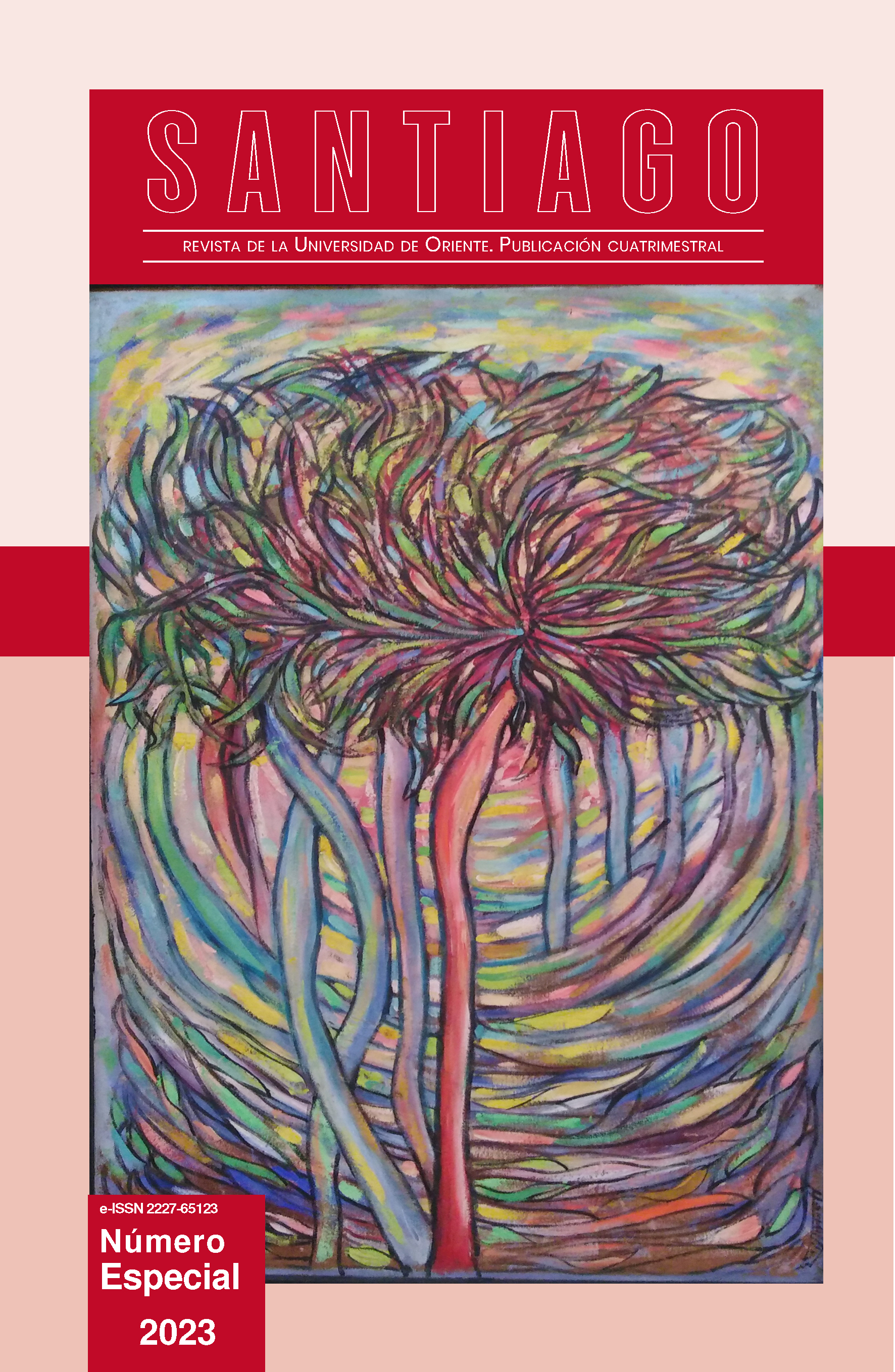Reflexiones en torno a la equidad de género. Una mirada desde la temática energética
Palabras clave:
género, energía, sostenibilidad.Resumen
El género constituye eje de análisis en el debate actual
tanto de la sociedad civil, los Estados así como de los proyectos de
colaboración, agencias y organismos nacionales e internacionales. El liderazgo
y participación en el sector de las energías renovables es propósito
esencial en la contribución al bienestar socioeconómico mediante
tecnologías resilientes, a partir del uso de fuentes más amigables al medio
ambiente, en busca de un desarrollo energético integral y sostenible
como solución ante la creciente demanda de energía. Sin embargo, es
una realidad que en torno a la energía existe una praxis estereotipada
de su acceso y uso que cada uno de los géneros le dan. La construcción
de sociedades más equitativas y justas inspira el presente trabajo, la
reflexión en torno a los vínculos entre género, energía y sostenibilidad
sigue siendo un desafío ante la complejidad que supone su análisis desde
una perspectiva de género.
Citas
Arora-Jonsson, S. (2011). Virtue and vulnerability: discourses on women, gender and climate change. Global Environmental Change, 21, 744-751.
Asamblea General de Naciones Unidas. (1987). Informe Brundtland. Comisión Mundial para el Medio Ambiente y el Desarrollo. http://www.forestalmaderero.com (Consultado el 28 de noviembre 2022)
Asamblea General de Naciones Unidas. (2015). Lanzamiento del Decenio de Energía Sostenible para Todos. http://www.news.un.org
Asamblea General de Naciones Unidas. (2015). Proyecto de documento final de la cumbre de las Naciones Unidas para la aprobación de la agenda para el desarrollo después de 2015 (A/69/L.85). http:// www.un.org
Bronson, D. (2014). Geoengineering: a gender issue?. En The Remaking of Social Contracts. Feminists in a Fierce New World, editado por Gita Sen y Marina Durano. Londres: Zed books.
Carlsson-Kanyama, A, Isabel J y Ulrike R. (2010). Unequal re-presentation of women and men in energy company boards and management groups: are there implications for mitigation? Energy Polic, 38(8), 4737-4740.
Carrasco, C. y Díaz, C. (2017). Economía feminista. Desafíos, propuestas, alianzas. Barcelona: Entrepueblos.
Chávez - Rodríguez, L. (2016). La importancia de la interseccionalidad en la vulnerabilidad social ante eventos hidrometeorológicos extremos en Yucatán, México. En Transformaciones ambientales e igualdad de género en América Latina: temas emergentes, estrategias y acciones, editado por Margarita Velázquez, Verónica Vázquez, Ana De Luca y Dulce María Sosa, 19-41. Cuernavaca: CRIM-UNAM.
Comisión Económica para América Latina y el Caribe (CEPAL). Mujeres y energía (LC/MEX/TS.2020/7), Ciudad de México, 2020. http://www.cepal.org/es/publications
Di Chiro, Giovanna. 2014. A new spelling of sustainability: enganging femi-nist-environmental justice theory and practice. En Practising feminist political ecologies. Moving beyong the green economy, editado por Wendy Harcourt e Ingrid Nelson, 211-237. Londres: Zed Books. https://doi.org/10.1596/1813-9450-5800
Fisher, E. & Santana, G, Y. (2020). Qualifications and Certificates v Practical Knowledge and Experience: Is There a Winner? Business and Economic Research, 10(2), 1-21. https://www.macrothink.org/journal/index.php/ber/article/view/16520
Fukuda-Parr S. (2016). From the Millennium Development Goals to the Sustainable Development Goals. Gender & Development, 1, 43-52. https://dx.doi.org/10.1080/13552074.2016.1145895
González Arostegui Mely (2020). Economía feminista y centralidad del trabajo. Por una comprensión justa y equitativa de la vida. Monografía El saber feminista. Una apuesta diferente por la vida (Compilación). Editorial filosofía@ ISBN 978-959-7197-39-3 www.filosofia.cu
Harcourt, W. (1994). Negotiating positions in the sustainable development debate: situating the feminist debate. Feminist perspectives on sustainable development, 11-25. Londres; Nueva Jersey: Zed Books; Rome: Society for Intenational Development
Listo, R. (2018). Gender myths in energy poverty literature: a critical discourse analysis. Energy Research and Social Science, 38, 9-18.
Nayar, A. (2014). Climate non-negotiables. En The remaking of social contracts. feminists in a fierce new world, editado por Gita Sen y Marina Durano, 105-120. Londres: Dawn
Organización Mundial de la Salud (OMS). (2021). Contaminación del aire doméstico y salud. Dirección URL: http:// www.who.int
Organización de Naciones Unidas (ONU Mujeres). (2018). Informe anual de ONU Mujeres 2018-2019. Dirección URL: http:/www.unwomen.org
Organización Internacional del Trabajo (OIT). (2021). Resumen ejecutivo: Avances y perspectivas una década después de la adopción del Convenio sobre las trabajadoras y trabajadores domésticos, 2011 (núm.189). Dirección URL: http:/www.ilo.org
Räty, R., Carlsson-Kanyama., A. (2010). Energy consumption by gender in some european countries. Energy Policy 38 (1): 646-649
Rojas, A., Siles, J. (2014). Guía sobre género y energía para capacitadoras(es) y gestoras(es) de políticas públicas y proyectos. Canadá: energía; OLADE; UICN
Santana González, Y., Torres Rodríguez, O., Rodríguez Martínez, Y., Silva Albear, Y., & Oris Martínez, L. (2022). Acciones de atención psicológica durante la covid-19 a través del chat “Santiago se Levanta”. Revista Conhecimento Online, 1, 189–212. https://doi.org/10.25112/rco.v1.2737
Sen, G., Durano M. (2014). The remaking of social contracts. Feminists in a fierce new world. Londres: Zed books
Zuria, A., Vázquez V., Bose P., and Velázquez, M. (2018). Introducción. Género, energía y sustentabilidad. Primeras aproximaciones desde la academia. En Género, energía y sustentabilidad. Aproximaciones desde la academia. Centro Regional de Investigaciones Multidisciplinarias Cuernavaca, México Dirección URL: https://www.researchgate.net/publication/328807124
Descargas
Publicado
Versiones
- 2024-03-10 (2)
- 2023-03-23 (1)
Número
Sección
Licencia
Derechos de autor 2023 Yanesy de la C. Serrano-Lorenzo, Lucrines Azcuy-Aguilera, Yamila Roque-Doval, Ariagnis Camellón-Pérez

Esta obra está bajo una licencia internacional Creative Commons Atribución-NoComercial-SinDerivadas 4.0.
CC Reconocimiento-NoComercial-SinObrasDerivadas 4.0





.jpg)
_de_logo.jpg)















 Universidad de Oriente
Universidad de Oriente 